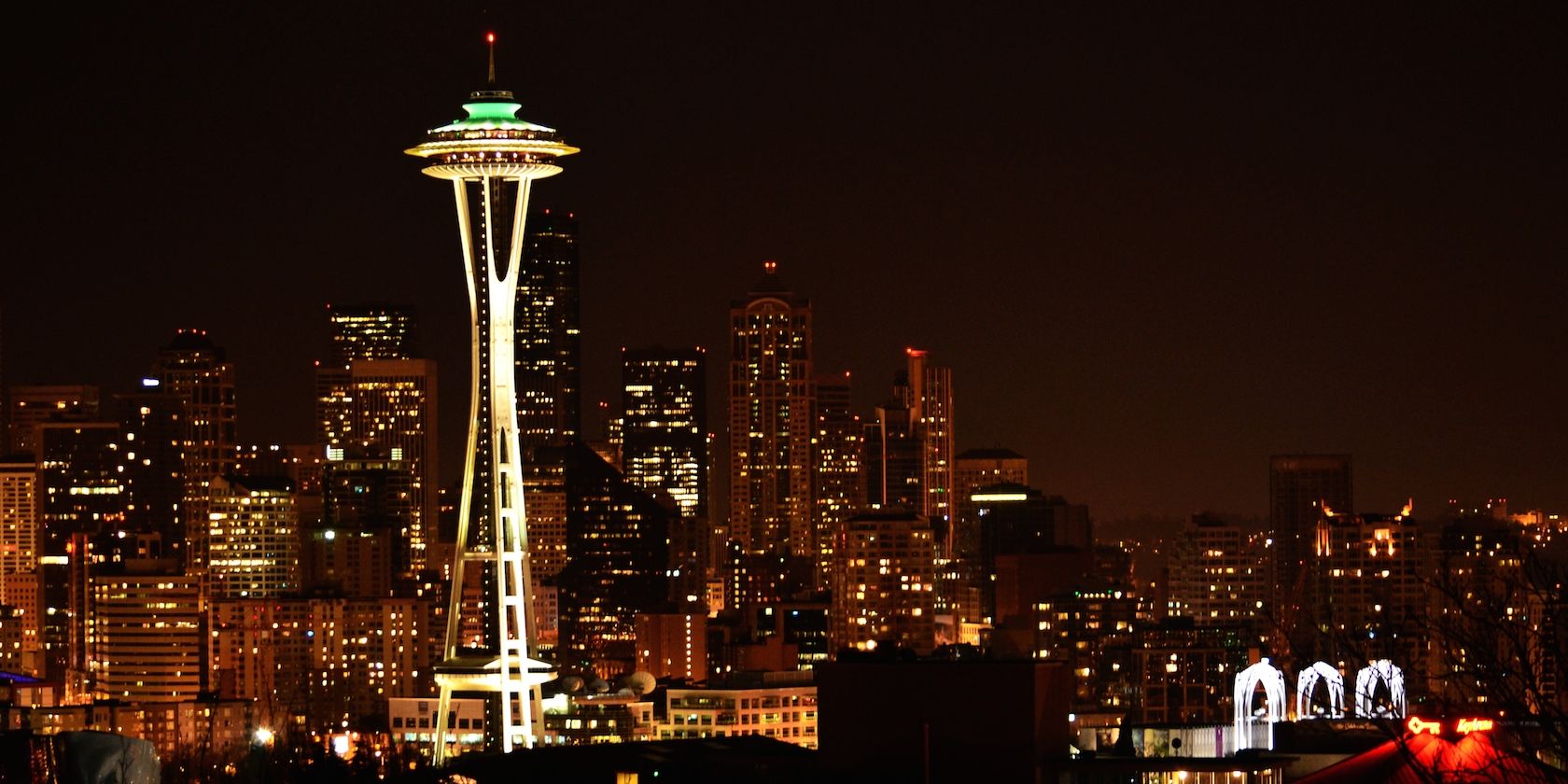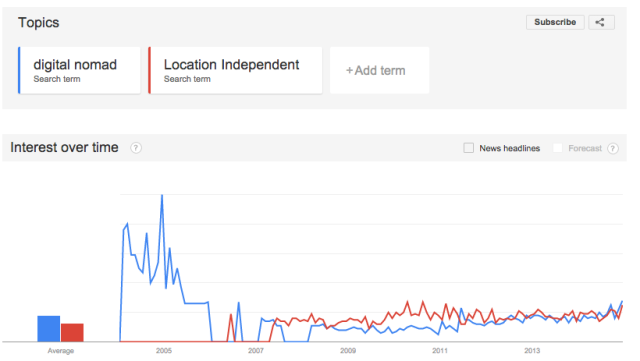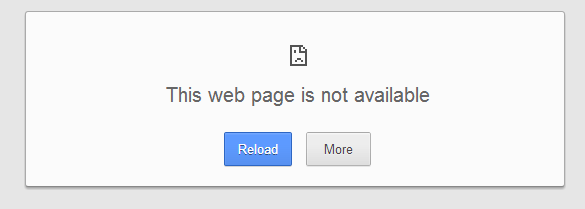Depending on where you went, you may have noticed them during a recent vacation. A few Y-Gens hunched over their MacBook Air in the local coffee shop, incessantly tapping away.
You might think they're tourists getting their Facebook fix, what would you say if I told you these were members of a growing movement? A group of people who work from coffee shops, hammocks, hostels and beaches around the world to run businesses, earn salaries, and to conduct their entire lives from wherever they see fit, provided there's reliable wifi?
Welcome to the location independent world of the Digital Nomad.
In 2004, when Cody McKibben was 24 years old, two of his close friends died. This prompted a fresh assessment of everything he thought was important in his life. By 2006, Cody had quit his job and from 2008 began working on his business in earnest from South East Asia –where life was cheaper, and seemingly that much sweeter. By starting off as a freelance web developer and consultant, then moving toward launching the successful Digital Nomad Academy, Cody has been able to fund a pretty enviable, profitable global lifestyle.
When Jodi Ettenberg set off an a one-year jaunt around the world, she was journaling her adventures on LegalNomad.com. On TheNextWeb she explains:
As the site grew, I began to receive offers for freelance writing and figured ‘why not see where it goes?’ I decided to keep the site ad-free (it still is) and in 2010, I moved it from blogger to WordPress. I started to build a routine that involved winters writing and eating in Asia and summers in North America, speaking at conferences and doing consulting work for social media.
Whether this idea inspires you to pursue something similar, or doesn't appeal to you at all, it's kind of amazing that it's even possible. Let's take a look at the history, benefits and drawbacks of this movement.
A Brief History of Digital Nomads
This digitally enabled nomadic lifestyle is one more and more people are attempting, but it hasn't been possible for very long – arguably only since the early '80s. Prior to this, nomads had very little (if any) reliance on anything that's digital.
It was way back in 1983 when Steve Roberts set out on his computerised recumbent bicycle to cover 14,000 miles around the US. On it's own, this would be an impressive enough feat. But while simultaneously peddling around the US, Roberts was also maintaining his full-time writing career.
In the early '80s, this was nothing short of revolutionary.
It’s in the faces of businessmen, sweating under their three-piece suits and regarding me over the remains of expense-account lunches. It’s in the faces of newspaper reporters who realise a few minutes into an interview that I am living their dream. It’s in faces old and faces young, faces barely tanned from a too-short Florida vacation and faces pallid that turn to catch a quick glimpse as I zip past the office window. It’s everywhere, for it’s a universal lust—the lust for freedom.
(Popular Computing Magazine, August 1984)
Whether Roberts' odyssey was the genesis of the 'Digital Nomad' movement is arguable, it certainly serves as a legitimate starting point for this brief exploration into this 'technomadic lifestyle' – a term used by Roberts, and picked up by the NY Times in 1999, that for some reason never caught on.
Back in the early '80s, one of Roberts' main concerns was how to save his articles with the rudimentary kit available. Using his standalone Model 100, "The memory would fill up halfway through the first feature-length article". Shortly thereafter, in 1983, the satellite system 'Motosat' allowed nomads to connect to the Net much easier. A decade later, as internet users burgeoned, and digital nomadism became a conceivable option that increasing (yet still relatively small) numbers of tiresome workers were considering, the first book on the topic, 'Digital Nomad' was published, in which a very apt, hopeful prediction was made.
"Within the next decade, for the first time for 10,000 years, most people will find that the geographic tie is dissolving. It will happen gradually and people will be slow to realise that a revolution is occurring, but by the end of those ten years, most people in the developed world will find themselves free to live where they want and travel as much as they want".
(Digital Nomad)
Although that prediction still hasn't been realised, the 'tech revolution' post-publication accelerated phenomenally, allowing swathes of previously geographically-tied workers to at last become digital nomads, at last quenching that universal "lust for freedom", provided their careers allowed for it. A far from exhaustive list of potentially nomadic careers can be seen here.
This acceleration of the movement may well predominantly be credited to the simplification of low-cost financial transactions thanks to Paypal (1998), the launch of freelancing sites such as Elance (1999), and the ease and reduced cost in keeping in touch with those back home and at the office thanks to Skype (2003). Not to mention more recent developments such as AirBnB (2008) and Slack (2013).
When Tim Ferriss launched his hugely successful NY Times bestseller "The 4-Hour-Workweek" (2007), the idea of digital nomadism (or location independence) reached a far wider audience. The book sold in excess of 1.3 million copies, and stirred countless readers to radically alter their lifestyle in search for that elusive, nomadic dream.
It's these tools, and this bestselling book, that inspired the lifestyle upheaval of a large number of popular nomadic bloggers – there are now more than 200. These writers, in turn, are inspiring the next generation of dissatisfied office-dwellers to tread a similar path.
During my own nomadic journey, it's become clear that an increasing number of global citizens are definitely taking advantage of the location independent options (privileges) available. This may be in the form or perpetual travel, or simply more regular, longer breaks away from home. For those who aren't yet location independent, it seems that almost all those I've spoken with are interested –n joining the ranks, but don't see how this can be accomplished.
That being said, digital nomadism is far from mainstream. And it definitely isn't a 'revolution' just yet, despite the predictions of people like Mike Elgan and The Washington Post. Take a look at the search traffic for the terms 'Digital Nomad' and 'Location Independence' for the last ten years to see what I mean.
A revolution? Definitely not. A slowly percolating movement? Definitely.
What's really interesting, though, is not so much the the 'how' of this movement, nor the exact numbers of people opting out of a more traditional lifestyle (which are impossible to calculate anyhow). What's interesting is the 'why'.
Why Is It So Attractive?
Why are so many people feeling such an urge to take this route? Why do so many people think it's such a dream? Why are so many people so dissatisfied with their current condition?
When Roberts alluded to that "universal lust – the lust for freedom", he was referring to what he saw as a fundamental Truth. It's that lust for freedom which engrains in us a resentment for anything that restrains us from its realisation. It's this lust for freedom that fills so many with a burning romanticism for the aimless wonderings of Kerouac, or the literary globe-trotting of Hemingway.
As this literary fantasy becomes ever more possible, and ever more visible on our Facebook and Instagram feeds via those travel-related #humblebrags of our friends who're already on their way to, or already living, that freedom, we can't help but think 'why not me?'
I asked friend and fellow Digital Nomad James Schipper his thoughts on this topic:
Within that deluge of information [that we're all victim to] come those other possibilities people didn't know about only a short time ago. "Wait, you mean those kids on their laptops in Starbucks were actually making a living doing that, and not just playing around on Facebook?".
Access to information also makes it harder to ignore the ache they may feel about the life they built not living up to their expectations. It's easier when everyone else is doing the traditional work life. But when you start realizing how many other ways there are to experience life and still pay your bills (if you choose to have bills at all), then it gets harder to motivate yourself to do that 9 to 5.
Or maybe it's just the sheer adventure of it all? An unattributed quote that Julia Safutdinova recently sent over to me was "don't live the same year 75 times and call it a life".
On a more pragmatic note, perhaps, living this way is just cheaper. As the world becomes smaller, and the freelance economy continues to explode, and the currencies we get paid in remain valuable, we see the real attraction of geo-arbitrage (a "financial concept where disparities between markets are leveraged to generate or broker a return"- AltLifeHack). We understand that if we performed our work-tasks on the other side of the globe, our lifestyle would be that much better. A bigger apartment, better food, more adventure, and more sun, all for a smaller price-tag. Or, simply, we could save more money for when we eventually return home.
After all, I've personally lived pretty comfortably in cities such as Chiang Mai, Thailand for less than $800 USD per month. Belgrade, Serbia for around $1000 per month. Cebu, Philippines for around $900 per month. The list goes on.
And then there are the side-benefits that you might not realise before you set off. The myriad friends, the fascinating conversations, the most random of situations you'll find yourself in, the 'broadening' mind, and the enforced minimalism that life on the road necessitates.
Where I love to "collect" (hoard), frequent moves require more focus on 'what do I actually need?' which in turn gives a fun push towards creativity: 'if I have these x things, what can I do with them?' instead of getting lost in unlimited options. Being a nomad is a great way to refocus and declutter in all areas of life.
The reality, as ever, is likely a mix. A mix of this romanticism and pragmatism- the dream for freedom, and the rational desire to have a better lifestyle for less cash.
But There Are Drawbacks
A life of travel and apparent freedom may look like a string of positives, and the perfect escape from the daily grind, but the term 'perfect' doesn't quite fit here, and is a topic I think deserves far more attention than it's received up to now.
I'm not sure most people realize the reality of day-to-day life on the road, especially when you have to work as you go to keep the money coming in. For example, I'm here in Cartagena, Colombia right now, and I'm working twelve hour days to finish a big project. I won't have time to do most of the fun tourist stuff before I leave.
Even when people hear this kind of thing though, they still fantasize about the digital nomad lifestyle. Again, I think it's because it's so different, and it feels like an escape from the default lifestyle that most people just fall into. I'll admit that the digital nomad lifestyle does have its moments, and I certainly prefer it to my old life working 9-to-5.
But as they say, with great freedom comes great responsibility. If you want to sustain a life of travel, you have to be disciplined, creative, and willing to make big sacrifices. You can have everything you want, but you can't have it all at the same time.
Harry Guinness, a fellow MakeUseOf writer and traveler talks of trials and tribulations on the road:
1. Distraction: When I was traveling with people who weren't working while travelling, and were just travelling while travelling, there was huge temptation to just say sod it and drink. Even aside from booze which was a full 24 hour right off, there was lots of other shiny new stuff going on that takes away from a desire to do some actual work.
2. Connectivity/Wifi/Battery: I was on a boat for a month and unless we were docked or had the engines running we only had 12 volt power. Enough to just about charge a phone but not enough to even keep the lights on on a laptop (see image below).
3. Home: Facebook in particular makes it way too easy to stay in contact with home too much. If I wasn't careful I could easily kill an hour or two just aimlessly chatting with mates online utterly defeating the purpose of being away.
When you're income relies on a reliable internet connection, who would have thought a simple 'web page is not available', and other infuriating techy problems for freelancers image could cause so much stress?!.
That being said, if you ask virtually anyone who's turned to a nomadic way of life, the thought of returning to a 9-5 grind often fills them with anxiety and dread. Sure, there are days and weeks which suck, but for digital nomads, the opportunity cost of choosing to be no longer nomadic is not a cost they're willing to pay. The thought of life 'before' is usually enough to dissipate any temporary temptations to go back to life 'as it was'.
But digital nomadism is not a life for everyone. Not everyone would find being away from friends and family for months (sometimes years) at a time something they would enjoy. Not everyone would enjoy never knowing where they might be in a months time. Not always being able to easily cook for yourself, get online, relax, have a quiet life and a place to call 'home'. Not everyone could hack only being able to travel to places that have 'good' wifi- what about those remote villages and national parks where the word 'Internet' has never been muttered, but which hold surprises and treasures for the intrepid travellers who venture those ways?
And along a similar note, not all digital nomads see themselves as being nomadic for the rest of their lives. For many, there may be distant plans of a return to 'home', or thoughts of settling down in a city they've fallen in love with. Yet this often comes with entrepreneurial plans to maintain financial independence, and more often than not, location independence, in order to retain that freedom they've worked so hard to build.
In all though, the opportunities that the digital revolution has afforded us are many, and digital nomadism is but just one. This is a young, minority movement still in its early stages that holds a romantic attractiveness to virtually anyone who hears the tales of nomads after an arduous days work in the office.
Can You See Yourself As A Nomad?
What do you think of this lifestyle? Is it something you would consider? And would it even be possible in your line of work?
If you want to learn more about the lives of a few other digital nomads, check out our article.






